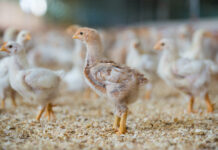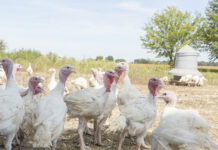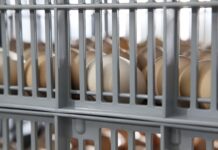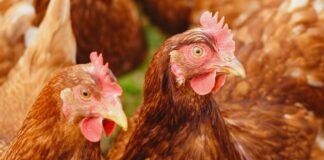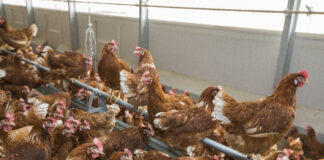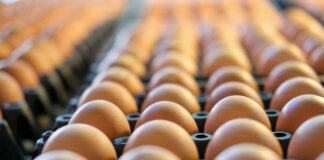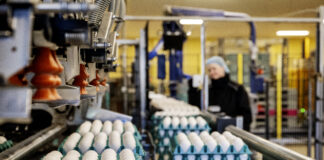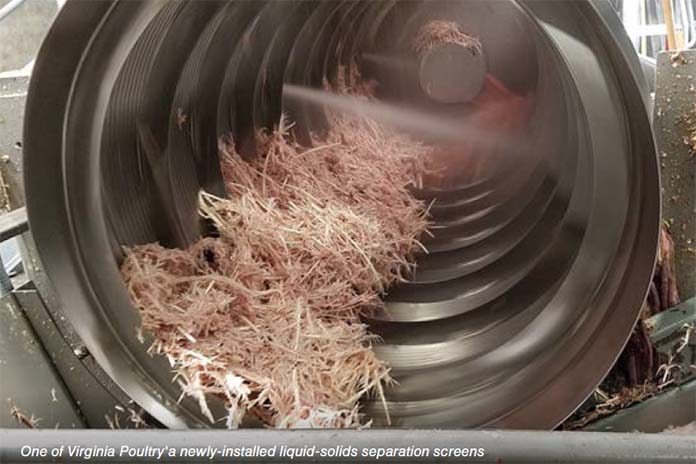
Virginia Poultry recently installed several liquid/solids separation screens for reducing water usage in its turkey feather and offal processing. The two new primary and one secondary state-of-the-art rotary-drum screens, provided by Lyco Manufacturing, are a showpiece for optimized throughput and operational efficiency, while reducing water consumption. Located in Hinton, Virginia, in the heart of the Shenandoah Valley, Virginia Poultry Growers Cooperative (Virginia Poultry or VPGC) is America’s eighth-largest turkey processor, and the second largest in Virginia. Supplied by 165 contract turkey growers spread throughout the Shenandoah Valley of Virginia and West Virginia, the cooperative processes 25,000 tom turkeys per day averaging 40 – 45 pounds each, five days per week – producing more than 250 million pounds of turkey annually. The plant 100-percent debones the whole turkey, sending the parts out to other plants for further processing.
Incorporated in 2004, VPGC has, since the beginning, been committed to producing an exceptional product. It was one of the original processors of antibiotic-free (AFB) and organic turkey products. Its programs have consistently been recognized by the trade as superior and verified independently as exceeding government and industry standards.
VPGC administers a proprietary organic program that carries the USDA Certified Organic Seal.
Employing 560 people working within its 250,000 square-foot state-of-the-art processing plant, Virginia Poultry’s business continues to grow, while the cooperative commensurately invests into upgrading its facilities and equipment. Recently, these upgrades included installing new liquid/solids separation screens form Lyco Manufacturing (Lyco) for its feather and offal processing.
Feather and offal screening efficiency
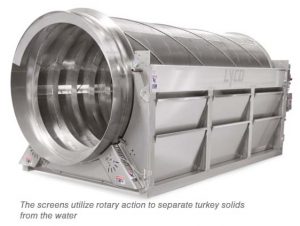 “We put in a new primary screen for liquid/solids separation of our feathers,” said Phil Miller, Engineering Manager at Virginia Poultry. “After the birds are killed, bled out and scalded, they are feather picked. That feather-laden water stream, flowing at about 500 GPM, is run though our new liquid/solids separation screen that separates the feathers from the water. The feathers go to rendering, while the de-feathered water is circulated back to the feather picking area for reuse, and combined with make-up water. This is a very efficient system for the continual reuse of this high-GPM flow of water. We also installed two new liquid/solids separation screens, on a line separate from the feather flow, in our offal area,” added Miller. “A primary screen that catches all of the water that flows from the evisceration process, and a secondary screen that captures smaller particulate before the offal water stream exits the building and into our wastewater treatment plant. The net result from using two screens is that more organic solids are screened out of the wastewater, which not only increases content for rendering, it decreases the amount of chemicals required for wastewater treatment.”
“We put in a new primary screen for liquid/solids separation of our feathers,” said Phil Miller, Engineering Manager at Virginia Poultry. “After the birds are killed, bled out and scalded, they are feather picked. That feather-laden water stream, flowing at about 500 GPM, is run though our new liquid/solids separation screen that separates the feathers from the water. The feathers go to rendering, while the de-feathered water is circulated back to the feather picking area for reuse, and combined with make-up water. This is a very efficient system for the continual reuse of this high-GPM flow of water. We also installed two new liquid/solids separation screens, on a line separate from the feather flow, in our offal area,” added Miller. “A primary screen that catches all of the water that flows from the evisceration process, and a secondary screen that captures smaller particulate before the offal water stream exits the building and into our wastewater treatment plant. The net result from using two screens is that more organic solids are screened out of the wastewater, which not only increases content for rendering, it decreases the amount of chemicals required for wastewater treatment.”
Following evisceration, and inside/outside bird wash, the turkey goes into a chiller. The liquid/solids separation equipment selected was single-rotary-drum screens from Lyco Manufacturing. The screens utilize rotary action to separate turkey solids from the water. The water stream enters the drum from the inside and screens out solids to within 0.04” with the primary screens, and to 0.02” with the secondary screen. The screens are manufactured from wedge-wire stainless steel. The triangular shaped wedge-wire is far less apt to plug than sheets that are perforated.
Traveling spray CIP conserves water usage
In poultry processing facilities, the efficient operation of rotary screens is diminished when poultry fats and other slick particulates clog the screen openings. Many screens let material pass through because they do not have the ability to manage the volume of particulate matter in the slurry. This is a common problem with traditional screening equipment – limiting the volume of wastewater and load that can be moved through a screen, which causes water and particulate to make their way through unfiltered.
“Conventional drum screens used in poultry processing utilize a spray bar for keeping the drum face from becoming clogged, which typically can consume up to 120 gallons of water per minute,” said Jeff Zittel, Vice President of Applications and Marketing with Lyco. “The feather, offal and secondary screens in use at Virginia Poultry, however, are much more water efficient.”
Each of the three Lyco screens utilizes a unique mechanical traveling spray clean-in-place (CIP) system. Using only two spray nozzles moving back and forth, the system effectively keeps the screen from clogging, but consumes only 10 GPM, approximately 10 percent of the water usage with conventional spray bars.
“Turkey processing is a high-water-usage activity,” explained Miller. “We are processing 900,000 to 1,000,000 gallons of water each day through our on-site wastewater treatment plant. For every gallon we buy, we have to pay to get rid of this high-fat and high-protein-content water. This was our main reason for putting in these Lyco rotary-drum screening systems, to reduce water consumption.”
Equipped with the low-water usage traveling sprays, the two primary screens and the secondary screen combined can save the plant up to 140,000 GPD of water usage, when compared to spray bars in use on conventional drum screens.
“From a maintenance viewpoint, running one production shift per day, we devote a full eight-hour second shift to cleaning and sanitation of the entire plant,” said Miller. “With the CIP spray system, the screens are pretty much self-cleaning, which is a definite positive.”
Mechanical integrity
Because liquid/solids separation equipment is subjected to long periods of operation under stringent and harsh conditions, many system designs do not satisfactorily maintained consistent effluent flow, particulate capture and uptime. For a liquid/solids separation system to be effective in capturing high levels of primary and secondary offal while maintaining high-uptime operability, it must be heavy-duty, durable, and engineered to be user-friendly, tool-friendly, mechanic-friendly, and operate with minimal maintenance.
Mechanically, the Lyco screens are designed with a number of unique features. For example:
- Inside the wedge-wire drum full continuous flights have been welded into place. This permits the drum to handle surges more efficiently.
- All dry components are positioned outside of the frame, easily accessible for maintenance. Automatic jack screws are also provided.
Centrifugal-cast drum support rings
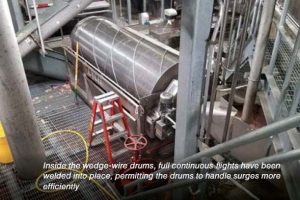 A very key aspect relating to the mechanical integrity of Virginia Poultry’s rotary drums is the centrifugal-casting of their drum support rings. It is common knowledge that rotating drum screens will eventually break apart. This is an inherent weakness in the way virtually all drum screens are designed and manufactured – which is to say, the stainless steel plate is rolled and welded. It is virtually impossible to get a drum screen of this size within close enough cylindrical tolerance, after having been rolled and welded, to keep it from eventually breaking apart. So all drum screens that have been conventionally manufactured have a limited life.
A very key aspect relating to the mechanical integrity of Virginia Poultry’s rotary drums is the centrifugal-casting of their drum support rings. It is common knowledge that rotating drum screens will eventually break apart. This is an inherent weakness in the way virtually all drum screens are designed and manufactured – which is to say, the stainless steel plate is rolled and welded. It is virtually impossible to get a drum screen of this size within close enough cylindrical tolerance, after having been rolled and welded, to keep it from eventually breaking apart. So all drum screens that have been conventionally manufactured have a limited life.
But that is not the case with the three Lyco single-drum, rotating screens in place at the 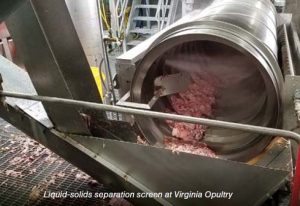 Virginia Poultry plant. These drum screens are manufactured completely different, there is no rolled plate and there is no welding. These drum supporting rings have been centrifugally cast to within 15,000ths-of-an-inch roundness. Molten metal is poured into a cast that is spinning at high speed. Consequently, they maintain their roundness for the life of the drum, and they do not break.
Virginia Poultry plant. These drum screens are manufactured completely different, there is no rolled plate and there is no welding. These drum supporting rings have been centrifugally cast to within 15,000ths-of-an-inch roundness. Molten metal is poured into a cast that is spinning at high speed. Consequently, they maintain their roundness for the life of the drum, and they do not break.
“When it came time recently to investigate screens for our plant we looked at a number of different options,” added Miller. “But these single-rotary-drum Lyco screens are very robust, and are very well constructed. Consequently, we felt they were the best choice for our plant’s processing operations and to reduce water usage.”
Virginia Poultry Growers Cooperative, LLC
Incorporated in 2004, and located in the heart of the Shenandoah Valley, Virginia Poultry Growers Cooperative (VPGC) has become America’s eighth-largest turkey processor. Supplied by 165 contract turkey growers spread throughout the Shenandoah Valley of Virginia and West Virginia, the cooperative processes over 250 million pounds of turkey annually. VPGC owns and operates a processing plant in Hinton, Virginia, a feed mill in Broadway, Virginia, and a grain unloading site in Harrisonburg, Virginia.
VPGC is one of the original processors of antibiotic-free and organic turkey products. Its programs have consistently been recognized by the trade as superior, and verified independently as exceeding government and industry standards.
For more information, contact Phil Miller, Engineering Manager, Virginia Poultry Growers Cooperative, LLC; 6349 Rawley Pike, Hinton, VA 22831; Tel: +1 540867-4000; Email: pmiller@vapgc.com – Website: www.vapgc.com
About Lyco Manufacturing, Inc.
Lyco Manufacturing is a world-leading manufacturer of commercial cooking and cooling machines, liquid-solid separation screens, root crop peelers/scrubbers, and snap bean equipment for the processing of pasta, rice, dry beans and vegetables. The company has designed and installed thousands of machines for 50 of the top 100 food companies in North America and many smaller food manufacturers.
Recognized worldwide for its innovative machine designs and the quality of its engineering, Lyco’s machinery has set the standard for increased capacity, improved product quality, reduced product damage and faster sanitary changeovers. The company’s passion is developing the best customer-aligned, innovative food processing machinery in the world.
Founded in 1980 by owner and Chairman of the Board, David R. Zittel, Lyco Manufacturing is housed in a state-of-the-art 80,000 square-foot facility located in Columbus, Wisconsin, USA, 30 miles northeast of the capital city of Madison.
For more information contact Jeff Zittel, Vice President of Applications and Marketing, Lyco Manufacturing, Inc.; Tel.: +1 920-623-4152; Email: jeff.zittel@lycomfg.com – Website: www.lycomfg.com


